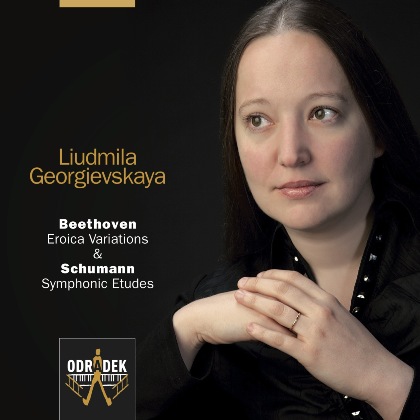- artist:Liudmila Georgievskaya
- featured artist:Liudmila Georgievskaya
- release year:2013
- style(s):Classical Period, Romantic Period
- country:Russian Federation
- formats:CD (Compact Disc)
- record posted by:Odradek Records
- label:Odradek Records
- buy this record
Russian pianist Liudmila Georgievskaya offers two of the great cycles of piano variations - Beethoven’s “Eroica” and Schumann’s Symphonic Etudes - in refined and attentive interpretations, at once personal and objective.
---
Artists's statement:
I always have felt particularly attracted to the variation form, for among other reasons the possibility of looking at its structure from multiple points of view. In both works on this disc there is a ternary background structure hidden beyond the evident self- contained episodes, and this unifying force is one of the characteristics that connects together the two variation cycles and makes them so fascinating to me.
In both, the first part is a block of “faster” variations, similar to a selection of miniatures. The slow variations play the role of the central part of the cycle, meanwhile each concludes with a distinct Finale.
The 15 variations in the Beethoven are a wonderful example of classical variation, based on the theme’s melodic material, harmony, tonality and even dimensions. But at the same time the presence of “introductory variations” to the 15 “fundamental” ones, as well as the fact that Beethoven concludes with a Finale alla Fuga, represent courageous steps towards a freer interpretation of the piano variations genre, to become typical of the Romantic period.
Schumann’s Symphonic Etudes are one of the first examples of this type of “free variation”, different from the classic one first of all because also the theme’s form is varied. If Beethoven uses the variations’ theme as the finale fugue’s theme, the grandiose Finale in Schumann’s cycle is the last variation; it clearly has traits of rondo-sonata form, very far from the initial three-part structure of the theme. At the same time, for all its novelty, instrumental polyphony is broadly present, connecting it to the keyboard traditions from the Baroque to the fugues in Beethoven’s big forms for piano.
These contrasting works, embodying two different epochs, have for me some internal link. I hope that the listener will be penetrated not only by the unrepeatable beauty of this music, but also by its significance in the history of piano composition.
-- Liudmila Georgievskaya
---
Reviews:
“The pianist Liudmila Georgievskaya plays two sets of variations on the Kafka-esque Odradek label. She plays Beethoven's fiteen Eroica Variations almost seamlessly, certainly with barely a pause for breath between each episode. Her touch is light at first as she pings out the simplest doh-soh, soh-doh theme... She tickles out two chromatic scales, highlights in their extreme difference to the two-note theme... She has perfect balance in the canon in variation VII and she crosses hands so smoothly in VIII and XI that you'd swear you could hear three octaves at once. The yodelling thirds in the right hand at IX sound freshly rustic but not as outright comic as the clumsy bass at VII. She speaks of frank unhappiness in the suddenly serious, minor XIV and solemnly effusive over the hemidemisemiquavers of XV. The last movement's complex fugue on the simple theme has the Russian pianist at her most brilliant, as if she had been waiting for this apotheosis since the beginning...
Words and Music: Study Leave Rick Jones December 10, 2013
---
“In her sleevenotes Liudmila Georgievskaya reveals that she has always been particularly drawn to the variation form, and the possibilities it provides for looking at a musical structure from multiple points of view, and the way in which she launches into Beethoven's Op 35 Eroica Variations immediately signals that there's a sharp, inquisitive mind shaping the performance, one that's quickly responsive to every change of direction that the series of 15 variations takes. It makes for an involving, energising experience, one that doesn't always go exactly the way you might expect or even want, but is certainly never dull.”
The Guardian Andrew Clements January 31, 2014
---
“The Russian pianist Liudmila Georgievskaya brings two colossal examples of the art of variation with Beethoven and Schumann. The orchestral piano of the master of Bonn makes a journey that almost seems historical due to the multitude of styles and ways it deals with its simple theme; a deployment of resources shows the musical maturity and genius of the master from preclassical purity to the prophetic romanticism awaiting his music, without lucking in good humor... And opposite this musical treatment that is transcendent in her search for the universal, the intimate and autobiographical character of Schumann’s variations makes an interesting contrast... Georgievskaya gives a pure, correct, elegant interpretation that could almost be labelled as restrained; her approach to Beethoven's classicism is very accurate, variations like the fourth one are executed in a pristine way, and the runaway finale borders on perfection... It is an album that brings us to one of the most curious musical forms: variations and their endless possibilities.”
**** EXCELENTE - Ritmo Inés Ruiz Artola March 2014



